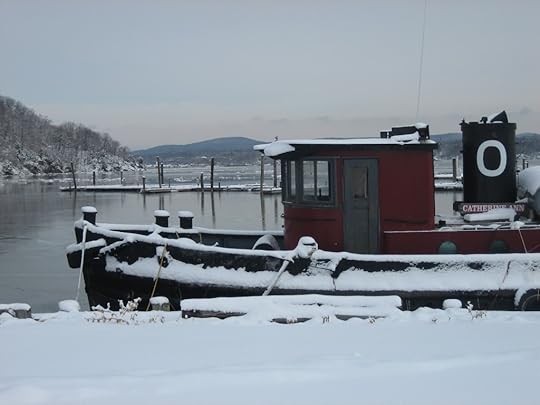The lesson of an old boat
For the third time in as many weeks I'm rising to find the world coated white. First 20″, then 6″ more, and so far this morning there's another fresh 12″ and still falling. There are ice flows on the Hudson River and aside from a single plowed path, the boatyard is slowly starting to resemble a small glacier with waist-deep drifts surrounding the shed. Along the docks the high wind has kept the accumulation lower, but for those of you in warmer climates, here's a picture to show you what you're missing.
My parents claim that 'boat' was one of my first words. At the rate I'm going it's likely to be among my last as well. That's not surprising, being that boats were a constant from my earliest days – from open skiff and a runabout to eventually a 1954 Wheeler. And it was that old wood Wheeler that left an indelible mark on me. It was the late 70's and fiberglass had established itself as the material of choice for modern boat-building. Wood had been eclipsed by that point, and though wooden boats were still fairly abundant many had begun to languish into neglect. Fiberglass cast its glossy spell, promising years of seamless, maintenance and leak-free boating: no scraping, no sanding, no caulking… and no ROT. It would take another decade or two for people to realize these plastic boats were not invulnerable; beneath that fading shine a multitude of flaws, structural issues and potentially costly repairs might lurk unseen. These days the sight of a wood boat draws admiring stares and compliments as boaters recognize wood for its elegance and beauty, but when I was growing up wooden boats were, for the most part, second-class boats. Wood was what you bought if you couldn't afford glass.
Looking back all these years later, the thing that stands out most in my memory about the Wheeler was the work, ever-present and ongoing, but so very satisfying. I could happily scrape and sand the bottom for hours; that boat was 'mine' and that made it the best boat in the world. I loved to paint and varnish; my work was clean and neat so it became my assigned task, one I took great pride in. And I loved the engine-room. The boat was originally single-screw, then repowered in the sixties with a pair of GMC 453s, leaving limited space to work. Being small and agile, I was often sent down between those engines, handed tools and instructed along. The machinery fascinated me and I held the title of 'bilge rat' with honor. And while I worked away, contently oblivious to people playing on the newer boats surrounding us, I felt great. I knew the glowing brightwork, that flawless boot-stripe and countless other little details were MY doing.
It's been well over thirty years since my parents sold the Wheeler and much has changed in that time. It's ironic that in '07 when I was buying Annabel Lee, a 1950s Wheeler I saw listed was far beyond my means, but the fiberglass 1978 Cheoy Lee trawler my parents had dreamt of had become the tired old boat just within my limited budget. She's sturdy and overbuilt but she's old and much work lies ahead as my husband and I restore her. But those years aboard the Wheeler taught me to appreciate the feeling of accomplishment that comes from hard work. Plenty of people around us simply pay the yard to maintain their boats; the only time they ever set foot aboard is to lounge at the dock or cruise somewhere. I'm not knocking that, in fact perhaps they're onto something. I've often questioned my own sanity when it comes to this boat and the work I've undertaken. Maybe I scraped a bit too much paint as a kid. But in the end I prefer to know my boat inside and out and I'm more confident cruising with an understanding of how everything from the engine to the steering hydraulics operate. But it's something else, something more personal. It comes down to that feeling I get when all is said and done, when I step back knowing I have something to show for all my work.
Just as with boat repairs and maintenance, I believe what you get out of writing is directly proportional to what you put in. It's work, but if you truly enjoy that what you're doing it isn't so much a chore as a labor of love. In the end you're left with not only a sense of accomplishment but something tangible – something you can point to and proudly say "That's mine."
Share on Facebook




